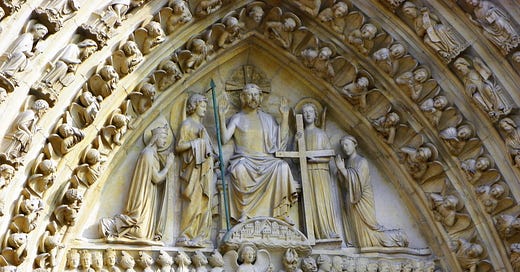My oldest brother died on this day, in 2012. Cliche, but I can hardly believe it has been ten years. Whenever there is some major world event, I realize how much I miss him, as he was the one sibling with whom I would always talk about politics, history, art, anything in the headlines. He always sought out my thoughts, and likewise. It hit home for me when Queen Elizabeth II died that I had no one in my family to call. Friends? Yes. My spouse? Of course. But the loss of my brother left a certain gap, and I mention it because a) I don’t want to let the anniversary go by unnoted, and b) one thing I would dearly love to discuss with him are these half-wits throwing soup and mashed potatoes at masterpieces. What blows my mind is how many people are trying to excuse this behaviour.
In 2019, after years of cynicism about religion, I began to attend church services - something for another post, perhaps, though I’m inclined to think one’s spiritual life should remain private. Throughout the pandemic, I attended services via Zoom and now we are back in person again, which is lovely. Still, I got quite irritated this past week when the priest referenced this article and said that it was awful if we cared more for van Gogh’s flowers than real ones and that raising awareness of climate change was paramount. Seriously? Who isn’t aware of climate change? And trust me, someone who isn’t aware or concerned isn’t going to change their view because a Monet was attacked. Also, are those really the only options? Destroying art or destroying the planet? That strikes me as a false premise. And please, don’t say, “Well, they chose paintings with glass over them.” I don’t care. The works of van Gogh and Monet are among the things that make life worth living (as is nature) and putting them at risk rather than, say, actually doing something for the environment, is cowardly and lazy.
Of course, protecting life is more important than protecting an object, than protecting art - I have vague memories of Proust saying something along these lines in one of his books that I read as an undergrad. But again, are those our choices? One of the half-truths of the Second World War is that the French surrendered because they did not want their beautiful Paris destroyed. Some things (fighting actual Nazis) are worth destroying masterpieces over, but in reality, things were more layered and complex - I recommend this book if you are interested in why the French crumbled as they did. (Interestingly, Eisenhower had not planned to liberate Paris in the summer of 1944, but the potential destruction of the city by the Nazis caused him to change course. A good book about it here.)
Art should be protected, when it is possible to do so. I remember when Notre-Dame burned, I was absolutely beside myself but grateful there was a chance to save and rebuild it and that certain French billionaires had pledged money toward the project. But there are always naysayers, are there not? One of the worst possible takes on the situation was the, “Instead of putting all that money toward reconstructing Notre-Dame why not build houses for everyone on the planet?” I actually heard this from a couple of friends. As with the throwing of soup at a van Gogh, one shakes one’s head in wonder. Those are not the options. The dichotomy is not, “Rebuild one of the most magnificent structures in human history or help low-income people find a home.” It’s like guns versus butter - in fact, we can have both. (And anyway, as my economist spouse says, if you subsidize housing you will end up with a housing shortage and people who need homes still won’t have them.)
[Detail of a high relief from the façade of Notre Dame Cathedral. Photo: Rondi Adamson]
There was an awful lot of “worst possible take-ism” going on last year when Jeff Bezos sent Blue Origin a-soaring. A common refrain was, “Instead of building your rocket ship you should solve world hunger.” If the whiners had an iota of creative thinking they would understand that, a) exciting people’s imaginations is, like great art, another thing that makes life worth living, and b) the economic activity generated as a result of such innovations is taxable and could potentially create more wealth and revenue than you could generate by personally shaking down a Bezos or a Musk.
Similarly, one cannot measure the emotional, intellectual and spiritual wealth we get from art, whether it is a Monet, or the Pantheon in Rome or even a great film, we seek comfort in these places. A friend of mine sent me a joke about how it was interesting that these activists don’t throw soup on a Jackson Pollock painting - how could you tell? And this week, we had the news that a German museum had been hanging a Mondrian painting upside down for decades. I’m no fan of modern art so I got a kick out of my friend’s joke and the Mondrian headlines, but whether it is to my liking or not, whether it is Notre Dame or Palmyra, Monet or van Gogh or Ai Weiwei’s studio - whether the destruction or attempted destruction is deliberate or accidental, political or theocratic - what these losses and aggressions take away is immeasurable. The courts can decide how to deal with the eco-soup-throwers (isn’t that a waste of food, by the way?) but let us not excuse and rationalize their actions.



